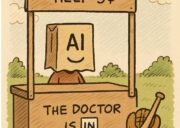
On the occasion of Read a Book Day, a day of American origin but now celebrated worldwide to commemorate and rediscover the pleasure of reading and learning, we have decided to offer an in-depth exploration of the origins of books, from when their dissemination became more accessible with the introduction of printing, up to the present day.
Indeed, even though books are now widely accessible to everyone, whether in digital or physical copies, they still face numerous challenges, one of the latest being their interaction with artificial intelligence. Will AI prove to be an ally or a foe to the world of books?
Let’s begin by retracing the long journey taken by novels and textbooks from the time of Gutenberg onwards.

Read also: The Story of Google: How Two Students Created an Empire
The Evolution of Books: How Reading Has Changed Over the Centuries
We’ve all studied, or at least should have studied, the birth of printing when Johannes Gutenberg introduced movable type printing in the 15th century. This revolutionary innovation allowed, not overnight but through a long process lasting centuries, the large-scale production of books, democratizing access to knowledge and ushering in the era of the Protestant Reformation and Humanism.
Thus, movable type printing undoubtedly marked the beginning of a new era for written culture, making books more affordable even for people outside the nobility or clergy. Authors could finally reach a wider audience, and ideas also gained the strength and means to spread more rapidly across Europe. Gutenberg’s Bible, printed around 1455, was one of the first books produced with this technology, and its influence on religion and culture was enormous.
Over the centuries, book production became increasingly efficient, and their impact on society steadily grew. In the 19th century, the Industrial Revolution led to the introduction of the rotary printing press, enabling mass production of newspapers and magazines. This accelerated the dissemination of news and ideas, beginning to shape a more informed society.
The 20th century saw further innovations in the world of books. The invention of coated paper and modern bindings made books more durable and visually appealing, while the introduction of the paperback book made them easier to transport. The creation of public libraries further democratized access to reading.
However, the 20th century also brought other significant and radical changes with the advent of the digital revolution. In the 1970s, the first e-book reader was developed, but that technology was not yet ready for the general public. However, with the advent of the internet, everything changed irreversibly, including in the publishing world.
The Digital Revolution: The Advent of the Internet and AI
It was only in the 2000s that e-books began to gain popularity, thanks to the introduction of the Kindle by Amazon in 2007. These portable devices allowed people to carry thousands of books in a single device, opening up new opportunities for reading.
But the digital revolution didn’t stop there. In 2008, Apple’s App Store officially opened the door to the distribution of reading apps on smartphones and tablets, allowing readers to access their digital books even more flexibly. E-book sales grew rapidly, but along with them arose the now decade-old debate about the survival of printed books.
While digital versions of books are still gaining ground, another reading format is emerging: audiobooks. Thanks to advancements in recording technology and the increasing popularity of smartphones, audiobooks have gained a wide audience. Listening to a book has transformed the reading experience, making it accessible to an audience that struggled with traditional reading due to consumption preferences.
But perhaps the most surprising development has been the introduction of artificial intelligence into the world of books. AI has begun to influence the very creation of books. Text generation algorithms, based on neural networks, can now write stories, poems, and even entire novels. This new frontier has sparked debates about human creativity and the possibility that the art of writing could be replaced by machines.
The publishing industry has had to and will continue to adapt to these changes. Publishers have realized that the audience desires different reading options, including printed versions, e-books, and audiobooks. At the same time, authors have strived to find creative ways to leverage new technologies, creating interactive multimedia works and using social platforms to promote their works.
The evolution of books will certainly not stop here. And it will be up to us to understand how to face the next phases, which will undoubtedly involve coexisting with artificial intelligence.




